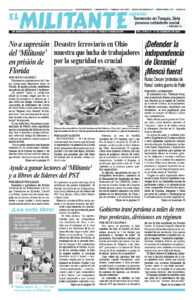Russian President Vladimir Putin is launching a large-scale new assault in the east of Ukraine on the one-year anniversary of his regime’s invasion. Despite suffering multiple battlefield defeats at the hands of Ukraine’s military and its many working-class volunteer fighters, Putin still aims to crush their independence with even more death and destruction.
Alongside missile strikes targeting power plants, infrastructure and civilian housing, Moscow’s larger forces are encircling Bakhmut in the Donbas region. Tens of thousands of Russian conscripts have reinforced the mercenary army of the pro-Moscow Wagner Group. Over months they have made incremental advances, threatening Ukrainian control of the city, which is largely destroyed. So far fierce resistance has prevented Putin’s forces from fully occupying the Donbas, which Moscow first invaded in 2014.
To avoid heavier losses, Ukrainian defenses have pulled back in some areas. Moscow’s tactics of sending human waves of poorly trained and inadequately armed Russian soldiers against well dug-in Ukrainian combatants has pushed the death toll among its troops to the highest rate since the start of the war.
Showing the regime’s utter contempt for its own troops, almost a third of wounded Russian soldiers in Horlivka hospitals in Donetsk are suffering from frostbite because they hadn’t been supplied with adequate winter uniforms. Tens of thousands of Wagner mercenaries were recruited from Russian jails. Promised freedom if they survived the fighting, they know they‘ll be shot if they disobey orders.
“We are nobody and have no rights,” a Wagner ex-convict named Sergei, who was captured by Ukrainian soldiers, told the New York Times.
Moscow’s various forces are not the only Russians fighting near Bakhmut. Several hundred soldiers from the Free Russia Legion of the Ukrainian army are defending the city from Putin’s attempt to seize it. The unit is made up of Russians who live in Ukraine or who decided to move there after Putin’s invasion and are proudly defending the country’s sovereignty.
Moscow threatens Moldova
The repercussions of the largest war in Europe since World War II continue to spread. Charging that Washington and its allies in Europe are making Moldova “anti-Russian,” Moscow’s foreign minister, Sergei Lavrov, Feb. 4 threatened that the country could become “the next Ukraine.”
The Moldovan government is holding talks to join the European Union. Since its invasion of Ukraine, Moscow has severed gas and electricity supplies to Moldova. The country’s foreign trade has collapsed and inflation has hit 30%.
The Kremlin is using about 2,000 troops it stations in Transnistria — an enclave in eastern Moldova controlled by pro-Moscow separatists — to pressure Moldova’s government. President Maia Sandu accused Moscow of plotting to overthrow her rule Feb. 13, days after Prime Minister Natalia Gavrilita resigned, citing “many crises caused by Russian aggression.”
Delivery workers strike in Russia
Despite jailing political opponents and protesters against his war, Putin has been unable to stamp them out. In fact, protests have increased in the last month, since Russian bombs killed dozens of Ukrainians in a housing complex in Dnipro. Despite the war drive, Putin has been unable to prevent workers organizing to defend themselves from bosses’ attacks.
Some 3,800 food delivery workers, members of the Courier union, staged a strike in more than 15 cities Dec. 20-25, to fight for better wages and conditions. Their employer, tech giant Yandex, owns the country’s monopoly food delivery service, Yandex.Eats.
When Yandex acquired its main competitor, Delivery Club, in September, bosses’ cut workers’ pay from 110 rubles ($1.59) per order to 70 rubles. The company’s profits soared 124%. Yandex bosses — like app company bosses worldwide —treat workers as self-employed in order to try to deny them benefits and rights. Yandex forces the drivers to cover all their own expenses. Without any labor rights, the drivers have no redress if Yandex cuts them off from its app.
In a further example of Putin’s repressive rule, two Crimean Tatar leaders, Kostiantyn Shyrinh and Dzhemil Gafarov, died in prison after brutal treatment, it was revealed this month. They were framed up on charges of spying and terrorism. Their real crime, in the eyes of Russia’s rulers, was their opposition to Moscow’s 2014 annexation of Crimea and their defense of the Crimean Tatars’ decadeslong struggle for national rights. Although both men were gravely ill, prison authorities denied them medical treatment.

